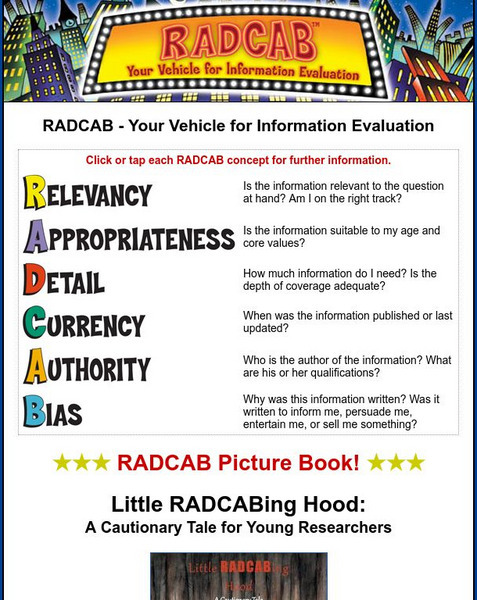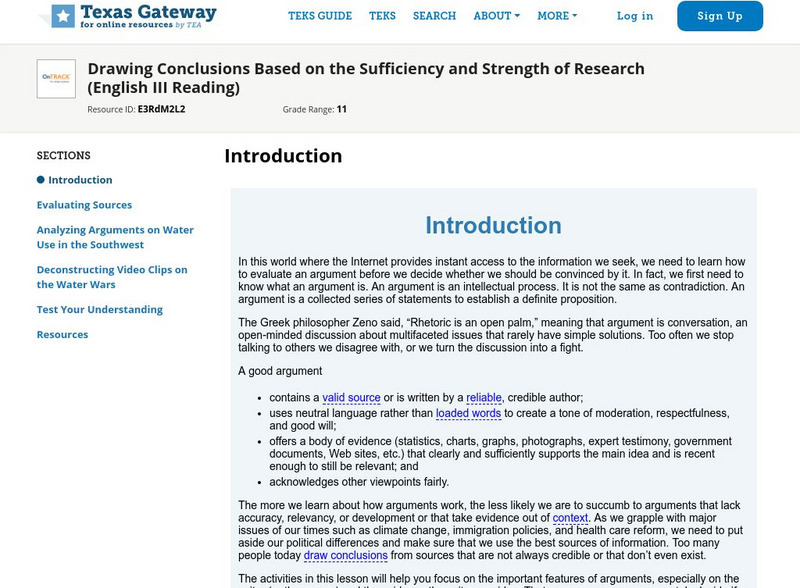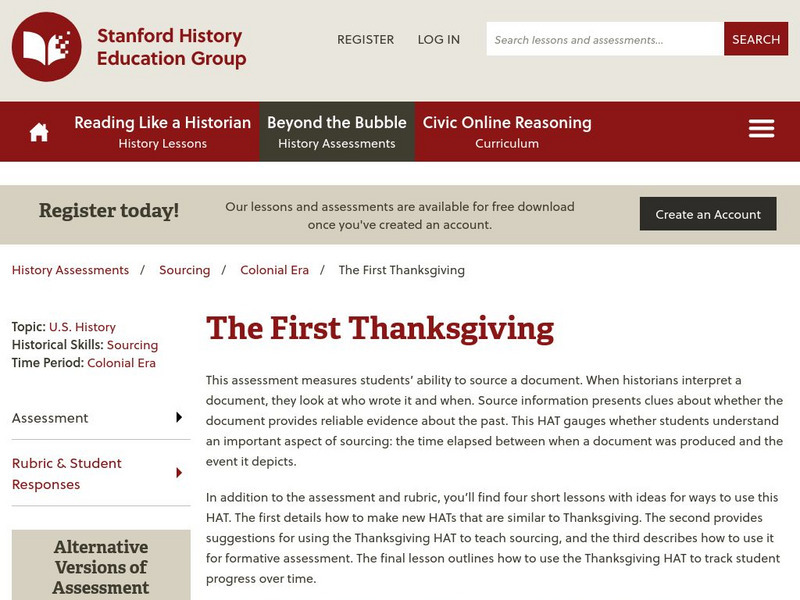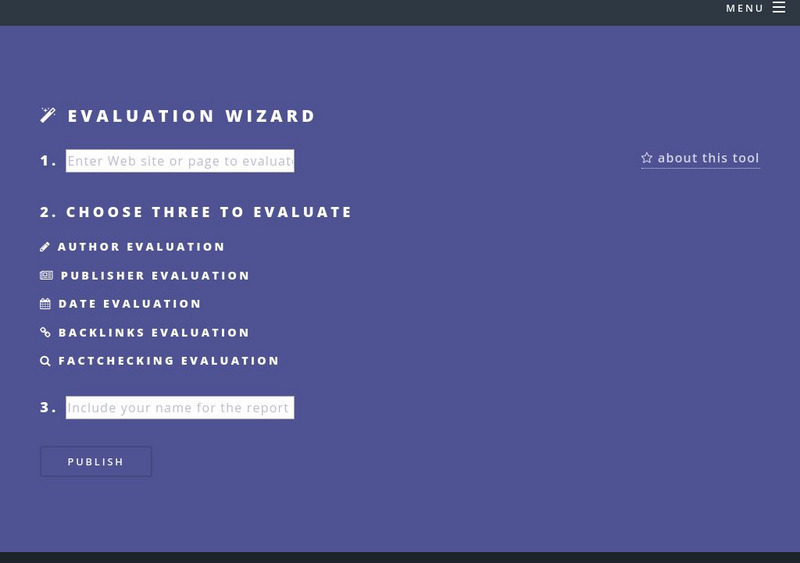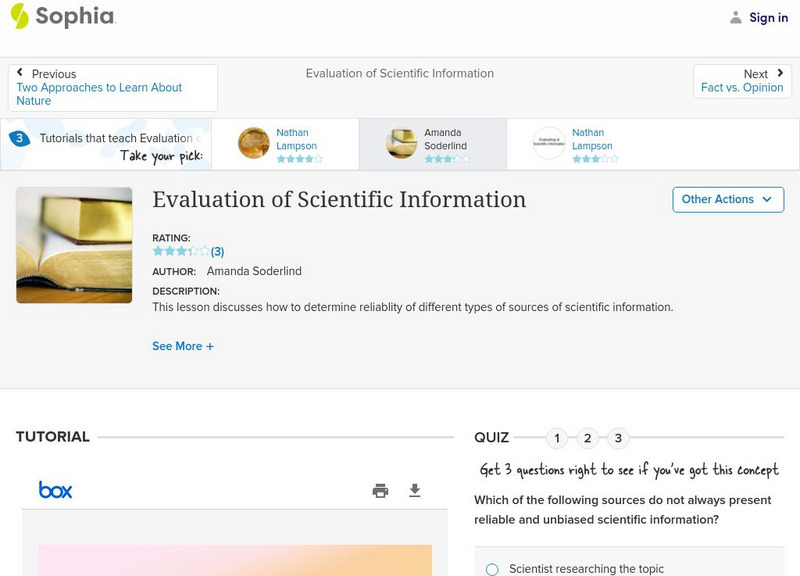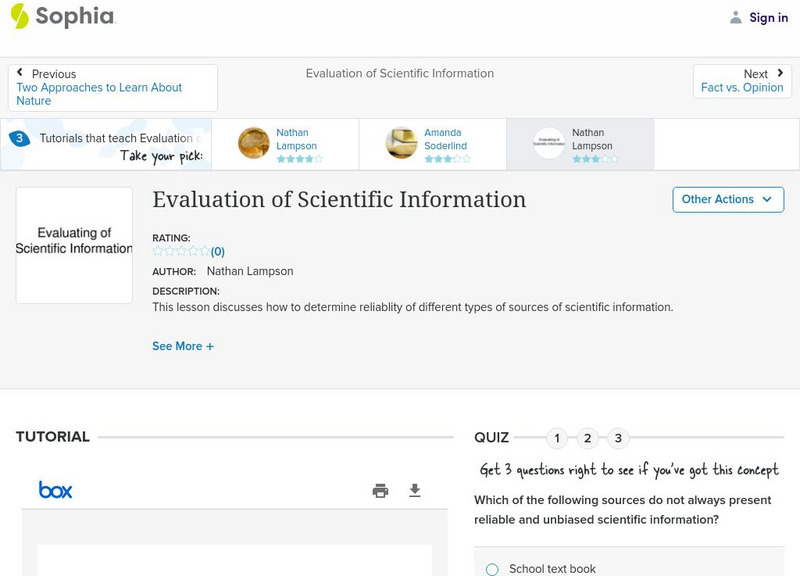Hi, what do you want to do?
Stanford University
Sheg: Document Based History: Reading Like a Historian: Evaluating Sources
[Free Registration/Login Required] Are all historical sources equally trustworthy? How might the reliability of a historical document be affected by the circumstances under which it was created? In this activity, students sharpen their...
Virtual Salt
Virtual Salt: Evaluating Internet Research Resources
This site by Virtual Salt offers a great deal of information on evaluating internet sources. Gives tips on what to look for when screening information for usefulness and reliability.
Stanford University
Sheg: Document Based History: Reading Like a Historian:sourcing Classroom Poster
[Free Registration/Login Required] Sourcing asks students to consider who wrote a document as well as the circumstances of its creation. Who authored a given document? When? For what purpose? This poster reminds students before reading a...
New York Times
New York Times: Evaluating Sources in a 'Post Truth' World: Fake News
[Free Registration/Login Required] Need help determining fake news from real news? This seems to be a problem today. Find practical activities and questions to help navigate a media landscape in which it is increasingly difficult to tell...
Other
Radcab: Your Vehicle for Information Evaluation
How do you know you are using a trustworthy source when writing a research paper? Use this acronym for easy questions to ask yourself to make sure you have a reliable source. Click on each one for further details.
Louisiana Department of Education
Louisiana Doe: Curriculum Hub: Ela Guidebooks: Application Student Selected Task: Evaluate Resources
We will evaluate the usefulness of sources, select sources for our research, and record bibliographic information for the sources we select. This will help us prepare our research.
Texas Education Agency
Texas Gateway: Drawing Conclusions on the Sufficiency and Strength of Research
The activities in this lesson will help you focus on the important features of arguments, especially on the writer (or the source) and the evidence the writer provides. That way, you can more accurately decide if an argument is valid and...
Stanford University
Beyond the Bubble: The First Thanksgiving
[Free Registration/Login Required] This history assessment measures students' ability to source a document, in this case a painting of the first Thanksgiving celebration. When historians interpret a document, they look at who wrote it...
Stanford University
Beyond the Bubble: Lange's Iconic Photograph
[Free Registration/Login Required] The Resettlement Administration was one of President Franklin Roosevelt's agencies that helped people from the Dust Bowl. This agency hired photographer Dorothea Lange to take pictures that would build...
ReadWriteThink
Read Write Think: Hoax/no Hoax? Online Comprehension and Evaluation Strategies
Students use research-based comprehension strategies to read and evaluate websites, and practice analysis by comparing hoax and real websites and by identifying false or misleading information. SL.11-12.2 Eval&Integrate sources
Childnet
Childnet: Online Safety: Safer Internet Day
Safer Internet Day 2021 will be celebrated in the UK with the theme: An internet we trust: exploring reliability in the online world. The campaign focuses on how we can decide what to trust online, supporting young people to question,...
Other
Monash University Library: Evaluating What You Find
This site explains how to evaluate the information you find in your research and provides practice exercises. It includes three sections: Evaluating the reliability of sources, Academic research on the internet, and Evaluating academic...
Information Fluency
Imsa 21 Cif Portal: Evaluation Wizard
Internet content is not reviewed like published written material - so how do you know if the information you found on the Internet is reliable? Use this Evaluation Wizard to guide you through a thorough assessment of any Internet...
University of Maryland
Howard County Public School System: Which John Smith Is Telling the Truth? [Pdf]
Students will read two accounts of John Smith's meeting with Powhattan and evalute which one is likely to be more accurate based upon the reliability of the sources.
Stanford University
Stanford History Education Group: Factory Life
[Free Registration/Login Required] A lesson to help students work in discussion groups to evaluate data and resources when the information is contrasting over the same event. Discussion groups Particular to this lesson explore primary...
Other
Expert click.com: Yearbook of Experts
This site, which is provided for by Expert Click.com, gives an online encyclopedia of sources for journalists and broadcasters.
Other
Usc Annenberg: Online Journalism Review
A review of journalistic issues and news, the OJR covers journalism worldwide, especially in cyberspace.
Other
University of Virginia: Center for Politics
This non-partisan site serves "as readily accessible resource for scholars, reporters, officeholders and the general public on issues central to our system of government."
Other
Vanderbilt University: Helping Young Children Control Anger & Handle Disappoint
Strategies are provided that will help students deal with upsetting times in their lives.
Sophia Learning
Sophia: Evaluation of Scientific Information: Lesson 2
This lesson discusses how to determine reliablity of different types of sources of scientific information. It is 2 of 3 in the series titled "Evaluation of Scientific Information."
Sophia Learning
Sophia: Evaluation of Scientific Information: Lesson 3
This lesson discusses how to determine reliablity of different types of sources of scientific information. It is 3 of 3 in the series titled "Evaluation of Scientific Information."
Childnet
Childnet: Online Safety: Get Answers
Got questions about how to stay safe online and what to do when things go wrong? Get answers here! It includes questions concerning cyberbullying, meeting people from online, online gaming, time spent online, what does the report button...
Texas Education Agency
Texas Gateway: Analysis of Relative Values of Specific Data, Facts, and Ideas
[Accessible by TX Educators. Free Registration/Login Required] In this lesson we will talk about reviewing the facts and data you use to support your arguments and assessing the reliability of the sources you use.
Other
The Center for Public Integrity: Home Page
Excellent site for journalists and others who feel that it is their beat to keep a watchful eye on the political culture of the country through investigations and analyses of public service.








